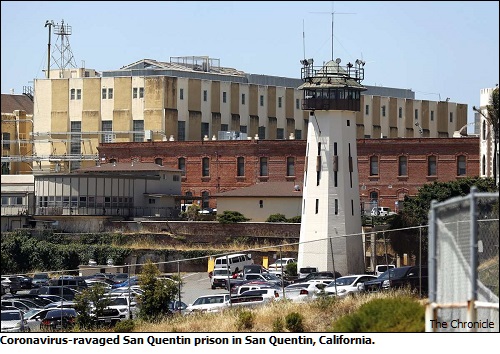
|
|

|
|
| April 26, 2024 |
|
California to release 8,000 prisoners by end of August amid coronavirus outbreaks 
SACRAMENTO - Gov. Gavin Newsom will release approximately 8,000 people incarcerated inside California’s prison system by the end of August in an effort to save lives amid devastating coronavirus outbreaks at several facilities and pressure from lawmakers and advocates.
The releases, which were announced Friday, will come on a rolling basis, and they will include both people who were scheduled to be freed soon and people at high risk of serious complications if they contract the virus. Across state prisons, 2,286 people in custody were confirmed to have active cases of the virus and 31 had died as of Friday morning, according to the California Department of Corrections and Rehabilitation. Staffers with active cases of the virus totaled 719. The first round of releases will free people who have 180 days or less to serve on their sentence, making about 4,800 prisoners eligible for release by the end of the month, officials said. Additional reviews will be conducted for incarcerated people with a year or less to serve, and those who live in one of the eight prisons that house large numbers of high-risk patients. While health experts and prisoner advocates applauded the move, many said it still was not enough to curb a fast-moving outbreak inside California’s chronically overcrowded prisons. The institutions currently hold 123% of their design capacity. “We certainly appreciate the effort from the administration to reduce the prison population,” said Donald Specter, executive director of the Prison Law Office, an organization representing incarcerated clients in a long-running lawsuit over substandard medical care in California prisons. “We still remain concerned that there’s not enough space, especially in places like Vacaville and Folsom to house people safely if the virus gets into those institutions.” The plan follows other steps taken by prison officials in recent months, including freezing intake of new inmates while speeding up parole for thousands of others close to release, which have lowered the prison population by nearly 10,000 since the end of February. As of Wednesday, a total of nearly 104,725 individuals remained imprisoned in California’s 35 institutions. Nearly 20,000 people would need to be released just to reach 100% capacity. Newsom did not comment on the announcement Friday, but his corrections secretary, Ralph Diaz, said in a statement that prison officials “aim to implement these decompression measures in a way that aligns both public health and public safety.” Prisoners will be disqualified from the new releases if they are serving time for domestic violence or other violent crimes, as well as if they would need to register as a sex offender or are deemed to present a high risk of committing violent crimes. Those who are aged 30 or older and meet the criteria will be immediately eligible for release, prison officials said. Those 29 and under will be reviewed on a case-by-case basis, taking into account factors like medical risk and time served. On Thursday night, prison officials announced they would provide 12 weeks of credit to every inmate eligible for release who had not been found guilty of a serious rule violation between March 1 and July 5. The change, adopted because prisons have shut down their credit-earning programs during the pandemic, could lead to more than 2,000 inmates getting out by September. The state will also expedite the governor’s review for people who were granted parole, which can traditionally take about six months, Specter said. Additional releases will include people who are at high risk of dying if they get COVID-19, including people who are over 65 or have chronic health conditions or respiratory illnesses. Pregnant individuals, or those in hospice care, may also be considered. At San Quentin, the worst outbreak in the state and one of the largest in the country, hundreds of inmates became infected after a transfer of inmates from the California Institution for Men in Chino (San Bernardino County). The transfer introduced the virus to the North Bay prison, which until that time had no confirmed cases. As of Friday morning, 1,330 inmates at San Quentin were confirmed to have the virus and 205 staffers were infected. Seven inmates had already died of what officials suspected to be COVID-19 complications, including men on Death Row. Everyone who qualifies will be tested for COVID-19 within a week of their release. Prison officials will additionally make victim notifications prior to the releases and work to find reentry housing for those set free. (Source: The San Francisco Chronicle) Story Date: July 12, 2020
|